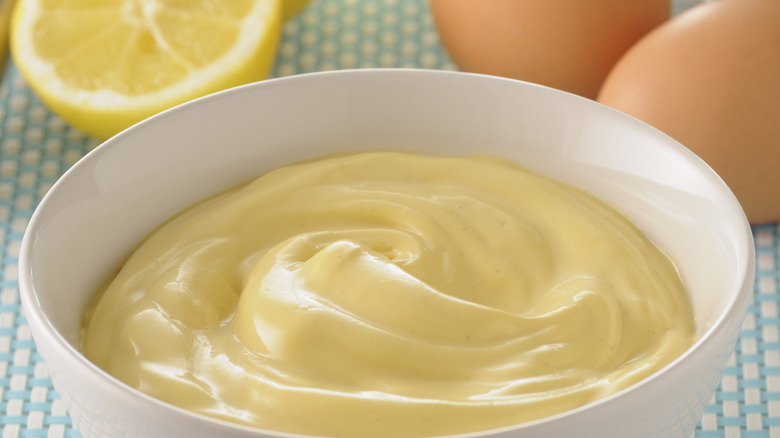You Can Stop Worrying About That Room Temperature Mayo On Your Sandwich
Mayo — the misunderstood, often maligned condiment that still manages to be one of the most popular sauces around the world, despite all the unwarranted hate. Some folks are outright disgusted by it, while others fear its mysterious, cream-like consistency. One of the biggest judgments heaped against mayo is that it is unsafe to eat if it's sat out for any time at all. But rest assured, mayonnaise is just fine to sit out for a few hours.
In fact, United States Food Safety says that an entire opened jar of mayo can sit out for eight hours without needing to be discarded. So the mayo on your club sandwich really isn't any different. That's because while mayo is an egg-based product, it's also made with the help of an acidic agent, typically white vinegar or lemon juice, and sometimes both. According to a study published in the National Library of Medicine, acid helps to ward off and slow down the spread of foodborne pathogens and bacteria. That means that mayonnaise effectively staves off any harmful growths and contaminants.
Mayo is not dairy-based
Another huge misconception when it comes to mayo is thinking that it is a dairy product. It is not. Eggs are poultry products, and mayo contains little more than eggs, acid, and neutral oil. In fact, it's very rare that any store-bought mayo contains dairy. That means it has different food safety recommendations than say, that pint of milk in your fridge.
But how is it so tantalizingly creamy, so unlike eggs? That's all thanks to the process known as emulsification. While we may associate mayo's super viscous consistency and rich flavor with cream and butter, it's actually the result of combining the fats and proteins of eggs with acid and oil. So when you're making up a few sandwiches for a picnic in the park, a mayo-based coleslaw, or potato salad for a potluck, you do not have to worry about mayonnaise-induced food poisoning.
In fact, the accompanying veggies and fruits are the most likely culprits of any food poisoning with produce accounting for 46% of all foodborne diseases and illnesses, according to the Centers for Disease Control and Prevention. To prevent food poisoning, it's helpful to add acid from either vinegar or citrus and keep foods in the fridge for as long as possible before transporting and serving. Go ahead and lob some mayo into your next chicken salad sandwich without fear.

